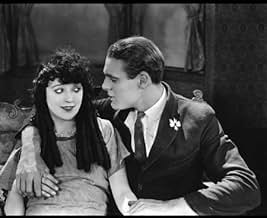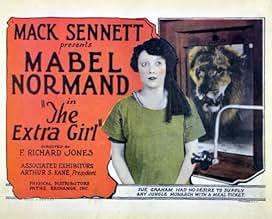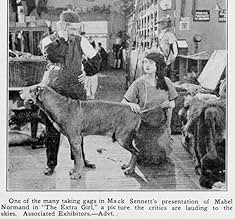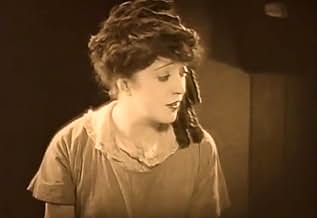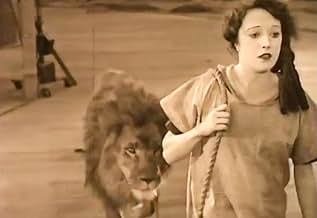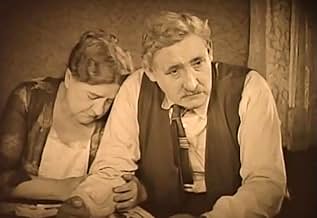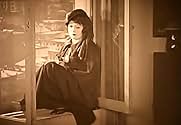IMDb RATING
6.7/10
1.2K
YOUR RATING
A small town girl dreams of movie stardom. A switched photo wins her a movie contract. However, when she arrives Hollywood, she is assigned to the props department. Her parents visit and inv... Read allA small town girl dreams of movie stardom. A switched photo wins her a movie contract. However, when she arrives Hollywood, she is assigned to the props department. Her parents visit and invest some money with a very shifty individual.A small town girl dreams of movie stardom. A switched photo wins her a movie contract. However, when she arrives Hollywood, she is assigned to the props department. Her parents visit and invest some money with a very shifty individual.
- Director
- Writers
- Stars
Anna Dodge
- Ma Graham
- (as Anna Hernandez)
George Beranger
- Actor in Wardrobe Line
- (as Andre Beranger)
Billy Armstrong
- Comedian in Derby
- (uncredited)
- Director
- Writers
- All cast & crew
- Production, box office & more at IMDbPro
Featured reviews
THE EXTRA GIRL (Pathe' Exchange, 1923), a Mack Sennett production, directed by F. Richard Jones, is a feature-length silent comedy starring Mabel Normand. With story and supervision by Mack Sennett, there's no traditional Keystone Kops nor climatic car chases, but basically a semi-comedy of one girl's dream to become a movie star and how almost everything seems to go in the wrong direction.
Opening with a title card: "Between the Rocky Mountains and Pittsburgh, but a long way from Hollywood, lies River Bend (Illinois) where the Graham family lives," followed by introduction to characters: "Pa" Graham (George Nichols), who runs a River Bend garage that was once his blacksmith shop; Aaron Appleton (Vernon Dent), a well-to-do druggist and Graham's choice for his future son-in-law; "Ma" Graham (Anna Hernandez) a wife and mother who copes with her movie struck daughter, Sue (Mabel Normand) by sitting back in her rocking chair and watching her act, as does Dave Giddings (Ralph Graves), Sue's childhood sweetheart and neighborhood mechanic. Realizing that their attachment to one another is more than "puppy love," "Pa" Graham insists Dave is to no longer visit Sue, and have Aaron calling and have her as his future bride. While answering a movie contest advertisement, Sue submits her frightful photograph. About to mail out her entry form, Sue finds she's unable to leave her parents and decides against it. Wanting to see Sue fulfill her dream, Dave has Belle Brown (Charlotte Mineau), known as the "grass widow," submit the photo herself. Wanting Dave all to herself and Sue out of the way, Belle substitutes her own photo over Sue's instead. Having not heard anything about the movie contest, Sue reluctantly agrees to please her father by marrying Aaron. Moments before the wedding is to take place, Dave arrives with a telegram that Sue has won the contest, and must catch the next train to Hollywood within fifteen minutes. With Dave's help, Sue escapes from her dreaded wedding and races over to the train station with Pa Graham and Aaron in hot pursuit. As the train pulls out, Sue watches her father at a distance and tearfully bids him farewell, with the old man waving back with his rejected would-be son-in-law beside him. Arriving at the Golden State Film Company, Sue meets with the studio manager who realizes the photos have been switched. Instead of getting a screen test, the studio manager, telling Sue to return home, decides on giving her a break working in the wardrobe department. Sometime later Dave comes to Hollywood, and to be near her, acquires employment at the same studio as a stage hand. As for the Grahams, it's Christmas and they become lonely for Sue. The couple decide to sell their home and accompany their daughter in the movie capital of the world, in spite the fact that she's not yet acted in a motion picture. Situations become more complex when Sue falls into the clutches of T. Philip Hackett (Ramsey Wallace), who swindles her parents by investing their entire savings in some"worthless oil stock.
Mabel Normand, whose movie career began with comedy shorts as early 1910, was nearing the end of her career by the time THE EXTRA GIRL went into theatrical release in early 1923. With other movies similar in theme dealing with the ups and downs of a movie hopeful (The 1926 release of ELLA CINDERS starring Colleen Moore, being one of the better ones), THE EXTRA GIRL goes a step further, taking a realistic approach as to what happens when a talented small town girl fails to succeed. Not precisely as sad as it all seems, THE EXTRA GIRL does present itself with some good intentional comedy. The most famous one involving Mabel mistaking a lion for a tamed one named Teddy, toggling the king of beasts on a rope behind her, eventually leading to a wild chase around the studio set after she discovers that she has the wrong lion. This five minute sequence must have stirred roars of laughter back then. Another funny scene finds Mabel making her screen test opposite actor William Desmond in a period setting wearing her hoop skirt and pantelettes. During the filming, she accidentally sits on a black glove leaving a hand print on her bottom tush, conveniently captured on film whenever she bends down. A screen test for a costume drama provokes laughter from the staff working behind the camera, but distresses the director, of course.
Aside from appearing a bit too old to be wearing those Mary Pickford curls during most of the story, indicating that the character of Sue Graham being a teenager or a girl of her early twenties, Mabel Normand, does show signs of exhaustion and worry, possibly due to personal problems of her own or over extensive retakes during production.
THE EXTRA GIRL, at 70 minutes (possibly longer in its initial premiere), was one of thirteen selected silent features to be presented during the summer months in the PBS weekly series of "The Silent Years" (1971), as hosted by Orson Welles, accompanied with an organ score by Jack Ward. In later years it turned up on cable television's Turner Classic Movies (TCM premiere: September 20, 2012, with piano score). As for her final screen appearance in a feature length comedy, the movie itself isn't as good as one would want it to be, but in spite of mixed comments and reputation, it can only be enjoyed by those who appreciate rare finds like Mabel Normand as THE EXTRA GIRL. Available on video and DVD from Kino International. (***)
Opening with a title card: "Between the Rocky Mountains and Pittsburgh, but a long way from Hollywood, lies River Bend (Illinois) where the Graham family lives," followed by introduction to characters: "Pa" Graham (George Nichols), who runs a River Bend garage that was once his blacksmith shop; Aaron Appleton (Vernon Dent), a well-to-do druggist and Graham's choice for his future son-in-law; "Ma" Graham (Anna Hernandez) a wife and mother who copes with her movie struck daughter, Sue (Mabel Normand) by sitting back in her rocking chair and watching her act, as does Dave Giddings (Ralph Graves), Sue's childhood sweetheart and neighborhood mechanic. Realizing that their attachment to one another is more than "puppy love," "Pa" Graham insists Dave is to no longer visit Sue, and have Aaron calling and have her as his future bride. While answering a movie contest advertisement, Sue submits her frightful photograph. About to mail out her entry form, Sue finds she's unable to leave her parents and decides against it. Wanting to see Sue fulfill her dream, Dave has Belle Brown (Charlotte Mineau), known as the "grass widow," submit the photo herself. Wanting Dave all to herself and Sue out of the way, Belle substitutes her own photo over Sue's instead. Having not heard anything about the movie contest, Sue reluctantly agrees to please her father by marrying Aaron. Moments before the wedding is to take place, Dave arrives with a telegram that Sue has won the contest, and must catch the next train to Hollywood within fifteen minutes. With Dave's help, Sue escapes from her dreaded wedding and races over to the train station with Pa Graham and Aaron in hot pursuit. As the train pulls out, Sue watches her father at a distance and tearfully bids him farewell, with the old man waving back with his rejected would-be son-in-law beside him. Arriving at the Golden State Film Company, Sue meets with the studio manager who realizes the photos have been switched. Instead of getting a screen test, the studio manager, telling Sue to return home, decides on giving her a break working in the wardrobe department. Sometime later Dave comes to Hollywood, and to be near her, acquires employment at the same studio as a stage hand. As for the Grahams, it's Christmas and they become lonely for Sue. The couple decide to sell their home and accompany their daughter in the movie capital of the world, in spite the fact that she's not yet acted in a motion picture. Situations become more complex when Sue falls into the clutches of T. Philip Hackett (Ramsey Wallace), who swindles her parents by investing their entire savings in some"worthless oil stock.
Mabel Normand, whose movie career began with comedy shorts as early 1910, was nearing the end of her career by the time THE EXTRA GIRL went into theatrical release in early 1923. With other movies similar in theme dealing with the ups and downs of a movie hopeful (The 1926 release of ELLA CINDERS starring Colleen Moore, being one of the better ones), THE EXTRA GIRL goes a step further, taking a realistic approach as to what happens when a talented small town girl fails to succeed. Not precisely as sad as it all seems, THE EXTRA GIRL does present itself with some good intentional comedy. The most famous one involving Mabel mistaking a lion for a tamed one named Teddy, toggling the king of beasts on a rope behind her, eventually leading to a wild chase around the studio set after she discovers that she has the wrong lion. This five minute sequence must have stirred roars of laughter back then. Another funny scene finds Mabel making her screen test opposite actor William Desmond in a period setting wearing her hoop skirt and pantelettes. During the filming, she accidentally sits on a black glove leaving a hand print on her bottom tush, conveniently captured on film whenever she bends down. A screen test for a costume drama provokes laughter from the staff working behind the camera, but distresses the director, of course.
Aside from appearing a bit too old to be wearing those Mary Pickford curls during most of the story, indicating that the character of Sue Graham being a teenager or a girl of her early twenties, Mabel Normand, does show signs of exhaustion and worry, possibly due to personal problems of her own or over extensive retakes during production.
THE EXTRA GIRL, at 70 minutes (possibly longer in its initial premiere), was one of thirteen selected silent features to be presented during the summer months in the PBS weekly series of "The Silent Years" (1971), as hosted by Orson Welles, accompanied with an organ score by Jack Ward. In later years it turned up on cable television's Turner Classic Movies (TCM premiere: September 20, 2012, with piano score). As for her final screen appearance in a feature length comedy, the movie itself isn't as good as one would want it to be, but in spite of mixed comments and reputation, it can only be enjoyed by those who appreciate rare finds like Mabel Normand as THE EXTRA GIRL. Available on video and DVD from Kino International. (***)
Mabel plays Sue Graham, a small-town girl whose picture is mixed up with that of a much prettier girl that a movie studio decides they want to put under contract. When Sue arrives on the scene, the studio discovers its mistake and assigns Sue to the props department. Sue does overcome adversity, but not before she mistakes a dog dressed as a lion for an actual lion and her parents come out to Hollywood for a visit and end up exchanging their life's savings for some worthless oil stock. Note Vernon Dent, later of the Columbia comic shorts and specifically the Three Stooges series, as Sue's unwanted suitor.
"The Extra Girl" is one of the more charming silent films I have enjoyed recently, and it's too bad Mabel Normand is remembered more for the Hollywood scandals of the roaring 20's than her charming comic persona in silent films. Her frequent costar, Roscoe "Fatty" Arbuckle, suffered a much worse fate - the end of his career - over a crime of which he was acquitted. Like The Primitive Lover, I'm surprised more people haven't seen this film. Check it out, you won't regret it. The best existing DVD copies are in very good shape, and detail is clearly visible. There are only a few signs of deterioration towards the middle of the film.
"The Extra Girl" is one of the more charming silent films I have enjoyed recently, and it's too bad Mabel Normand is remembered more for the Hollywood scandals of the roaring 20's than her charming comic persona in silent films. Her frequent costar, Roscoe "Fatty" Arbuckle, suffered a much worse fate - the end of his career - over a crime of which he was acquitted. Like The Primitive Lover, I'm surprised more people haven't seen this film. Check it out, you won't regret it. The best existing DVD copies are in very good shape, and detail is clearly visible. There are only a few signs of deterioration towards the middle of the film.
It has taken quite a while for THE EXTRA GIRL to make it to commercial DVD and now that it's finally here, we should all be grateful. But with that gratitude there should be some sadness as well for this 1923 film was the beginning of the end for one of the silent era's most gifted performers. Mabel Normand (1892-1930) began her career as a model for Charles Dana Gibson before breaking into films with Biograph in 1909. She moved over to Vitagraph and then left to be with Mack Sennett at Keystone in 1912.
In addition to being the silent era's greatest comedienne she was among the first women to write and direct her own material. She also directed Chaplin and Roscoe Arbuckle but was never given credit for it. She successfully moved from shorts to feature films before her run of bad luck began. Implicated but never charged in a series of scandals including the unsolved murder of director William Desmond Taylor, Mabel's career as a star unraveled during the 1920's. Drugs and alcohol aggravated the tuberculosis she had lived with for many years and she died at the age of 37 right at the dawn of the sound era.
Her association with Chaplin, Arbuckle, and the Keystone Kops have kept her face before the public but so little of her other work has survived and almost none of it is on DVD. This Kino release of THE EXTRA GIRL along with the 1913 Keystone one reeler THE GUSHER will certainly help. It also shows how much the nature of American film comedy evolved over 10 years. The visual quality of this disc taken from a 1969 Killiam Collection print is excellent with an organ soundtrack provided by Jack Ward that is above average for Killiam.
The story of a small town girl who goes to Hollywood has been done many times but Normand makes it her own even though at 30 she's too old for the role and it shows. You can watch her physical appearance change throughout the film reflecting the health problems she was dealing with. Nevertheless the backstage look at moviemaking, Normand's screen test, the escaped lion sequence, and the unhappy/happy ending are among many highlights the film has to offer...For more reviews visit The Capsule Critic.
In addition to being the silent era's greatest comedienne she was among the first women to write and direct her own material. She also directed Chaplin and Roscoe Arbuckle but was never given credit for it. She successfully moved from shorts to feature films before her run of bad luck began. Implicated but never charged in a series of scandals including the unsolved murder of director William Desmond Taylor, Mabel's career as a star unraveled during the 1920's. Drugs and alcohol aggravated the tuberculosis she had lived with for many years and she died at the age of 37 right at the dawn of the sound era.
Her association with Chaplin, Arbuckle, and the Keystone Kops have kept her face before the public but so little of her other work has survived and almost none of it is on DVD. This Kino release of THE EXTRA GIRL along with the 1913 Keystone one reeler THE GUSHER will certainly help. It also shows how much the nature of American film comedy evolved over 10 years. The visual quality of this disc taken from a 1969 Killiam Collection print is excellent with an organ soundtrack provided by Jack Ward that is above average for Killiam.
The story of a small town girl who goes to Hollywood has been done many times but Normand makes it her own even though at 30 she's too old for the role and it shows. You can watch her physical appearance change throughout the film reflecting the health problems she was dealing with. Nevertheless the backstage look at moviemaking, Normand's screen test, the escaped lion sequence, and the unhappy/happy ending are among many highlights the film has to offer...For more reviews visit The Capsule Critic.
Cute, fast-paced romantic comedy starring Mabel Normand as a small town girl who wants to be an actress and has two local rivals for her affections - Aaron Applejohn (Vernon Dent), not exactly a heartthrob, but well-to-do (her dad's choice for a son-in-law, of course) and Dave (Ralph Graves), her handsome longtime sweetheart who she loves. Mabel decides to mail in her photo to a Hollywood movie contest, but the "Widow Brown" decides to help things along and hopefully get Mabel out of town (and get Dave for herself) by switching the photo in the envelope to one of a beautiful young woman (hmmm - I think Mabel is beautiful too, so why the switch?!). Anyway, in the meantime dad decides to MAKE her marry Applejohn (and is actually ready to take his belt to her!) when the telegram from Hollywood arrives saying she won the contest - just in the nick of time! When she arrives and the movie studio sees that she is not the same woman, she is put to work in the costume department. Soon her parents, and Dave too, are all in Hollywood with her - but nothing works out the way she expects.
Well, this film is well done and full of fun - Mabel is a charmer in this, as usual, I just love her expressive face! There is a lively, fast chase at one point, where Mabel is trying to get to the train station before she has to get married, with dad and Applejohn in hot pursuit - all well done on real rural (looked like suburban twenties L.A.) streets. I also enjoyed the scene where Mabel leads a lion through the studio, under the belief it is actually "Teddy the dog" in a lion suit - quite amusing. The DVD version of this I saw featured a very decent looking print and excellent piano score by composer Ben Model that really suited the film well. A very entertaining film.
Well, this film is well done and full of fun - Mabel is a charmer in this, as usual, I just love her expressive face! There is a lively, fast chase at one point, where Mabel is trying to get to the train station before she has to get married, with dad and Applejohn in hot pursuit - all well done on real rural (looked like suburban twenties L.A.) streets. I also enjoyed the scene where Mabel leads a lion through the studio, under the belief it is actually "Teddy the dog" in a lion suit - quite amusing. The DVD version of this I saw featured a very decent looking print and excellent piano score by composer Ben Model that really suited the film well. A very entertaining film.
Country girl Mabel Normand travels to Hollywood in the hope of becoming a movie star after winning a competition, without realising that her love rival for the boy-next-door, Ralph Graves, substituted a glamour photo for her own, so she ends up working in the costume department. Normand's health problems were finally beginning to take their toll when she made this pleasant but unremarkable comedy, and the William Desmond Taylor affair had irreparably damaged her career, but she still makes a winning heroine. Highlights include her disastrous audition and a lion on the loose in the studio.
Did you know
- TriviaPenultimate feature film of Mabel Normand. She would not make another film for three years until her last feature Raggedy Rose (1926). Four shorts would follow in 1926-7 and she would pass away in 1930.
- Quotes
Dave Giddings: Sue wants to go into pictures. Do you think she has a chance?
- ConnectionsFeatured in The Great Chase (1962)
Details
- Release date
- Country of origin
- Language
- Also known as
- Millie of the Movies
- Filming locations
- Production company
- See more company credits at IMDbPro
- Runtime
- 1h 8m(68 min)
- Sound mix
- Aspect ratio
- 1.33 : 1
Contribute to this page
Suggest an edit or add missing content

